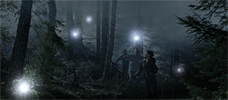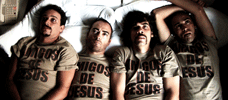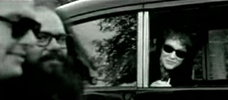Reviews
Penny Woolcock
UK, 2007
Credits
Review by Tom Huddleston
Posted on 14 October 2007
Source Artangel 35mm print
Categories The Times BFI 51st London Film Festival
For the past decade, Penny Woolcock has been quietly building a reputation as one of the UK’s most innovative writer-directors: her operatic John Adams collaboration The Death of Klinghoffer was nominated for several international festival awards, while last year’s Mischief Night was a hot ticket at the 50th London Film Festival. But on the evidence presented by Exodus, it’s very hard to see what the fuss is about: the film is amateurish, patronising and alarmingly unsubtle, a glib and predictable take on contemporary socio-politics.
The film is essentially a retelling of the Moses story in a modern context, tying in timely themes of immigration and terrorism, right wing scaremongering and liberal apathy. On the surface, this is a noble ambition: the book of Exodus does deal with some surprisingly relevant issues, from occupation, imprisonment and slavery to the moral dilemmas faced by an oppressed people forced into a violent uprising. In different hands, the film could definitely have worked. But Woolcock (like a number of other modern British filmmakers with a grounding in television) seems to have a violent aversion to any kind of depth or subtlety, hammering the parallels home with blunt force.
The character names are our first warning. Bernard Hill plays - wait for it - Pharoah Mann, a futuristic crypto-fascist politician who rules the coastal town of Margate (here renamed ‘The Promised Land’ for no apparent reason) with an iron fist, ordering that all asylum seekers, criminals and those deemed extraneous to society’s needs are impounded in the Dreamland facility, an indefinite holding area from which there is no escape. Meanwhile, his weak-hearted liberal wife Batya finds a baby on the shore, opting to bring him up as her own and christening him - you guessed it - Moses. Flash forward twenty years and Moses is growing up in privilege, studying marine biology (for plot reasons which will become painfully obvious later) and boffing the maid, Zipporah, a Dreamland resident herself. But on a tourist trip through the benighted prison camp Moses accidentally (and apparently effortlessly) kills a cop, forcing him to go on the run from the only world he has ever known…
As should already be apparent, the book of Exodus is followed slavishly throughout the film—Moses is reunited with his gypsy mother and smooth-talking brother Aaron, he marries Zipporah and becomes a leading light among the Dreamland residents. From a narrative point of view all this works, but as the plot thickens Woolcock begins to tie herself in knots trying to shoehorn elements from the biblical template into the ongoing story. With the plagues, it really falls apart: Moses’ youthful interest in marine algae leads him to create a mysterious deadly spore which turns the North Sea red, while a computer virus stands in for the plagues of frogs and flies (in case we missed the point, said virus causes the screen to be overrun by images of - yes! - frogs and flies). It all smacks of high school drama class, of middle aged, middle class intellectuals trying desperately to be relevant.
The cast is patchy at best. There are some fine actors in Exodus, most notably Bernard Hill as Pharoah, but even those with talent are hamstrung by the abysmal script: those without are really in trouble. Recent RADA graduate Daniel Percival is asked to carry the film as Moses, but he’s far from able to do so. The early scenes are no stretch, as Percival portrays Moses as a bratty upper-middle-class student divorced from reality. But as the character sinks deeper, embracing the darkness within and swearing a lot, Percival becomes steadily less convincing—this supposedly Messianic leader has zero charisma. As Zipporah, Clare-Hope Ashtley fares slightly better, her performance here a definite improvement over her rather awkward appearance in Children Of Men. And as the snappily dressed Aaron, newcomer Anthony Johnson is almost good, but again the script and a distinct lack of characterisation let him down.
The film’s strongest point is its production design, and the beautifully constructed, claustrophobic world of Dreamland. Essentially a seafront shanty town built from scrap in the empty carcass of an abandoned amusement park, the set is immersive, sprawling and wonderfully detailed, from strings of flags to Biblical graffiti, from the battered residential caravans to the struggling school. A key scene in the film features the burning of a giant wooden effigy, built entirely from refuse by Anthony Gormley—a strong if hardly original image. Another intelligent choice Woolcock makes is to eschew any use of contemporary music, and not to attempt to anticipate the sounds of the future—the score is simple but effective, a plaintive classical cello acting as counterpoint to the aggressively modern, urban images onscreen.
But such moments of good judgement are few and far between. Perhaps the film’s most frustrating aspect is its absolute lack of any kind of internal logic—Woolcock has points to make, and will happily twist reality to make them, even if it renders the film totally nonsensical. A good example is the band of feral children who run loose around Dreamland, forced to fend for themselves. Woolcock’s point is a valid one, that children are often the real victims of societal problems, that adults have the ability to choose a side and a moral position while children are used and abused without their consent. But once again she rams it home with a total absence of subtlety or logic—these feral children bark and whine instead of speaking, but we never see them in the company of animals. Woolcock has written the children as feral because it suits her agenda, not because it makes sense—in fact, the children are surrounded by adults, they live their lives in the middle of a functioning, if oppressive community, there is absolutely no reason why they wouldn’t learn speech, with or without the benefit of a standard education. Visit any slum anywhere in the world, and however destitute the children might be, they can at least speak the language—it’s a key survival skill.
Such lapses of logic pinpoint a very real lack of any guiding intelligence behind Exodus, which is ironic given how willing the film is to insult that of its audience. We’re constantly being reminded of the issues at stake here: the inhabitants of Dreamland are repeatedly likened to Jews under Hitler, or Arabs under Israel. Snippets from TV news shows are employed to fill holes in the plot, or bring the slow-witted among us up to speed—a lazy device at the best of times, wildly overutilised here. And although the film is surprisingly hard hitting when it comes to the ambiguities inherent in the story - Moses and his cohorts commit some terrible acts, and are certainly never portrayed as ‘heroes’ - what little perceptiveness there is gets overloaded and drowned by a conflicting mishmash of polemic, preachiness and plain bad writing.
More The Times BFI 51st London Film Festival
-

Island of Lost Souls
2007 -

Garage
2007 -

Exodus
2007 -

Friends of Jesus
2007 -

We Want Roses Too
2007 -

The Trap
2006 -

Captain Ahab
2007 -

Shotgun Stories
2007 -

Savage Grace
2007 -

The Assassination of Jesse James by the Coward Robert Ford
2007 -

The World Unseen
2007 -

Things We Lost In The Fire
2007 -

Lions for Lambs
2007 -

Talk to Me
2007 -

Redacted
2007 -

Battle For Haditha
2007 -

Chaotic Ana
2007 -

Angel
2007 -

Juno
2007 -

Fay Grim
2006 -

Reservation Road
2007 -

I’m Not There
2007
We don’t do comments anymore, but you may contact us here or find us on Twitter or Facebook.



